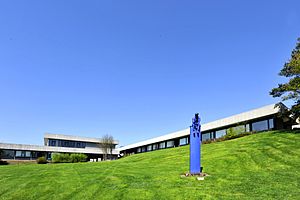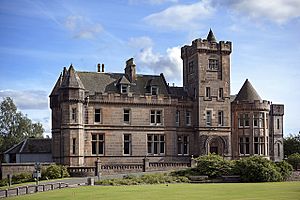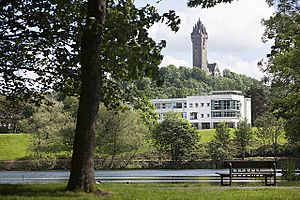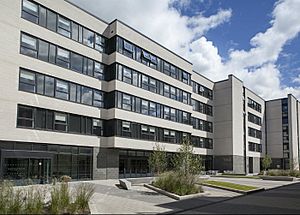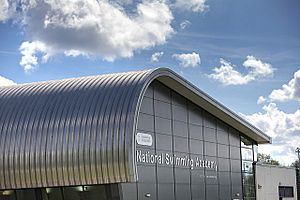University of Stirling facts for kids
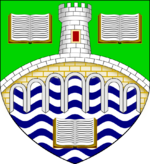 |
|
| Type | Public |
|---|---|
| Established | 1967 |
| Endowment | £1.87 million (2022) |
| Budget | £155.3 million (2021–22) |
| Chancellor | Jack McConnell |
| Principal | Gerry McCormac |
|
Administrative staff
|
1,872 |
| Students | (2015/16) |
| Undergraduates | (2015/16) |
| Postgraduates | (2015/16) |
| Location |
,
56°08′45″N 3°55′10″W / 56.14583°N 3.91944°W |
| Campus | 360 acres (1.5 km2) parkland campus |
| Colours | Heritage green and Energy green |
| Affiliations | Association of Commonwealth Universities Universities UK |
The University of Stirling is a public university in Stirling, Scotland. It was started by a special royal document in 1967. The university is built on the old Airthrey Castle estate. This area is in the middle part of Scotland.
The university campus is very large, about 360 acres. It includes the Stirling University Innovation Park. It also has a special centre for Dementia studies. The campus is located near the Ochil Hills. In 2002, the Airthrey Estate, where the university is, was named one of the UK's top 20 heritage sites from the 20th century.
As of 2022, about 14,000 students study here. Some students are full-time, and some are part-time. Stirling University works with other universities around the world. These include partners in China, Singapore, and Oman. The university offers a special master's degree in Human Rights and Diplomacy. This is the only program like it in the world. It is taught with the United Nations Institute for Training and Research.
Contents
History of Stirling University
Stirling was the first new university to open in Scotland in almost 400 years. Several places wanted to be the home of this new university. These included Falkirk, Perth, and Inverness. The person who suggested more universities be built in the UK, Lord Robbins, became the university's first leader in 1968.
The first building for the university's principal, Tom Cottrell, was finished in 1967. It was designed by famous architects. This building was later given a special protection status in 2009.
Early Buildings and Growth
The Pathfoot Building was the first main part of the campus. It opened in 1968. This building had classrooms, offices, and lecture halls. It also had a special area to show the university's art collection. Later, a Tropical Aquarium was added in 1979. A Virology Unit, which studies viruses, was added in 1987.
In 1993, the Pathfoot Building was chosen as one of Scotland's most important buildings from after World War II. It was also voted one of the best modern Scottish buildings. In 1970, work started on the Cottrell Building. This building was named after the first principal, Tom Cottrell. It holds many university offices, classrooms, and computer labs today. The university library and arts centre are in the Andrew Miller Building, finished in 1971.
Student Protests and Royal Visits
On October 13, 1972, Queen Elizabeth II visited the new campus. Students protested during her visit. They were upset about not having enough social spaces at the new university. News reports widely covered this event.
The university looked into the students' actions. Many students faced disciplinary actions. However, all charges were eventually dropped. The students continued their studies at Stirling. The Queen did not visit again until 2011. Prince Edward then officially opened the newly improved library.
New Departments and Buildings
A department for Business studies started in 1982. The Institute of Aquaculture also opened that year. This institute studies fish farming and genetics. In 1998, the R.G. Bomont Building was finished. It houses the Faculty of Social Science. The Iris Murdoch building opened in 2002. It is home to the Dementia Services Development Centre. The Colin Bell Building was completed in 2003.
University Campus
The university campus is located on 330 acres of land. It sits below the Ochil Hills, about 2 miles from Stirling city centre. Many people say it is one of the most beautiful campuses in the world. In 2016, it was ranked first in the UK for its campus environment.
The campus is on the historic Airthrey estate. This estate includes the 18th-century Airthrey Castle, designed by Robert Adam. It also has the Hermitage woods, Airthrey Loch (a lake), and a golf course. The Andrew Miller Building has a large open area called an Atrium. This area has shops, food places, a bookstore, and a bank. This building connects the Library, the Students' Union, and the MacRobert Arts Centre.
The Library has over 500,000 books and many journals. It also keeps special collections from famous writers and filmmakers. The Library was updated and reopened in August 2010. The MacRobert Arts Centre is a theatre and cinema. It is open to students and the public. The university also has a large collection of fine art in the Pathfoot Building. This collection includes paintings, tapestries, and sculptures.
The university used to have campuses in Inverness and Stornoway. These focused on Nursing and Midwifery. In 2016, these programs moved to the University of the Highlands and Islands.
Student Homes
The University of Stirling has homes for almost 3,000 students. These are on and off campus. Most students live in university halls on campus. There are also townhouses for families and groups of students. About 800 new rooms were built on campus between 2013 and 2015. This was part of a big investment in student housing.
Some of the student homes on campus include:
- Andrew Stewart Hall
- Willow Court Flats & Studios
- Beech Court Flats & Studios
- Juniper Court Flats & Studios
- Fraser of Allander House
- H H Donnelly House
- Muirhead House
- Polwarth House
- Penderich Way
- Spittal Hill
Homes off campus, in Stirling city centre, include Union Street, Bayne Street, Lyon Crescent, John Forty's Court, Centro House, and Alangrange.
Sports Facilities
In 2008, Stirling was named Scotland's University for Sporting Excellence. Students who are good at sports can get scholarships. These help them train for big competitions in football, golf, swimming, tennis, and triathlon.
The university has many sports facilities. These include a 9-hole Airthrey Golf Course. There is also a 50-metre swimming pool, which opened in 2001. This pool is part of the National Swimming Academy. The sports centre also has the Gannochy National Tennis Centre. It has courts for badminton and squash, a fitness centre, and sports halls. There are also all-weather playing fields. These facilities are for students, staff, and the public.
Many sports groups have their main offices at the campus. These include the Scottish Institute of Sport, Commonwealth Games Scotland, Scottish Swimming, and triathlonscotland.
At the Rio 2016 Olympics, several students and former students from Stirling competed for Great Britain. Swimmers like Duncan Scott and Robbie Renwick won silver medals. Ross Murdoch also won a Commonwealth gold medal.
Famous tennis players Andy Murray and his brother Jamie Murray trained on the university courts when they were young. Gordon Reid, who won an Olympic gold medal in wheelchair tennis in 2016, was a tennis scholar here. The university's golf teams are often ranked among the best in Europe.
The university's top football teams play in the main Scottish leagues. The men's team plays in the regional fifth tier. The women's team plays in the second tier. In January 2023, the men's football team made history. They reached the 4th round of the Scottish Cup. They lost 1-0 to Dundee United.
In 2018, the university announced a big plan to improve its sports facilities. A new sports centre opened in November 2020. This new centre has a large fitness area with over 100 stations. It also has new strength and conditioning areas. Stirling is one of the first UK universities to use Technogym's new Excite Live equipment.
International Study Programs
The university has special study programs with partners in Singapore, Oman, and Vietnam.
Ras al-Khaimah Campus
In 2018, the university opened a branch campus in Ras al-Khaimah. This campus is shared with four other university branches in the United Arab Emirates.
How the University is Organized
In August 2016, the university changed how it is organized. It now has four main faculties (groups of subjects). These are the Faculty of Social Sciences, Faculty of Arts and Humanities, Faculty of Natural Sciences, and Faculty of Health Sciences and Sport. It also has the Stirling Management School and the Stirling Graduate School.
University Leadership
The rules for the university are set out in its royal charter. The University Court is the main governing body. It is in charge of the university's money and plans. The Academic Council handles all academic matters. The daily running of the university is done by Gerry McCormac. He is the University Principal and Vice-Chancellor.
In June 2020, Professor McCormac was chosen to lead Universities Scotland. This group represents all universities in Scotland. His term started on August 1, 2020, and ended on July 31, 2022.
The university's Chancellor is Lord Jack McConnell. The university's rules and appointments are in its official calendar.
Past Chancellors
- Lord Robbins (1967 to 1978)
- Sir Harold Montague Finniston (1978 to 1988)
- 8th Lord Balfour of Burleigh, Robert Bruce (1988 to 1998)
- Dame Diana Rigg (1998 to 2008)
- James Naughtie (2008 to 2018)
- Lord Jack McConnell (2018 to present)
Past Principals
- Tom Cottrell (1967 to 1973)
- Sir Frederick Holliday (Acting Principal, 1973 to 1975)
- Sir William Alexander Cramond (1975 to 1981)
- Sir Kenneth (Ken) John Wilson Alexander (1981 to 1986)
- Arthur (John) Forty (1986 to 1994)
- Andrew Miller (1994 to 2001)
- Colin Bell (2001 to 2003)
- Christine Hallett (2005 to 2010)
- Gerry McCormac (2010 to present)
Academic Life
Teaching Style
Most Scottish university degrees take four years to complete. This helps students get a wide and flexible education. Stirling has offered four-year programs since it first opened. In the past, Stirling's flexible approach was new in the UK. Now, most universities work in a similar way.
Teaching at Stirling happens in two parts, called semesters. The school year starts in mid-September. The first semester ends in mid-December. The second semester runs from January to the end of May. Undergraduate students usually take three subjects in each semester. Each subject is worth 20 credit points. A regular degree needs at least 360 points.
The university offers many different courses. These include subjects in arts, sciences, business, and health. In 2016, Stirling received a 5 Star Excellence Award for its teaching quality.
Research at Stirling
Stirling is a university that focuses on research. It studies many different topics. These include Health and Wellbeing, Culture and Society, Environment, Business, and Sport. Almost three-quarters of the university's research is considered world-leading or excellent.
The university has some special research centres:
- Centre for Environment, Heritage and Policy
- Stirling Media Research Institute (SMRI)
- Stirling Centre for Scottish Studies
- Dementia Services Development Centre
- Centre for Gender and Feminist Studies
- Centre for Transnational Legal Methods
- Stirling Environment and Energy Network
- Centre of Postcolonial Studies
- Stirling Centre for International Publishing and Communication
- Contemporary Portuguese Political History Research Centre
- Stirling Centre for Translation, Interpreting and Intercultural Studies
- Centre for Policy, Conflict and Co-Operation
- Scottish Law and Innovation Network (SCOTLIN)
The university also has a database called STORRE. This lets people read many research papers for free.
Working with Businesses
The university has strong connections with businesses through the Stirling University Innovation Park. This large science park started in 1993. It is next to the main campus. About 50 companies work here, doing different kinds of research and development. The university also has a Conference Centre with rooms for guests. This is now called the Stirling Court Hotel.
University Reputation and Rankings
| National rankings | |
|---|---|
| Complete (2021) | 51 |
| Guardian (2021) | 94 |
| Times / Sunday Times (2021) | 63 |
| Global rankings | |
| ARWU (2020) | 801–900 |
| QS (2021) |
517= |
| THE (2021) | 401–500 |
Stirling is a well-regarded university in the UK. It is known for its good teaching and useful research. It is among the top 50 universities in the world that are less than 50 years old. It ranks 2nd in the UK and 46th globally in this group. It is also among the top 40 in the UK in The Complete University Guide.
The university is ranked 1st in Scotland and 3rd in the UK for helping graduates find jobs. More than 96% of graduates find work or continue their studies within six months of finishing.
In 2016, Stirling University received 5 stars in five areas from QS World University Rankings. These areas were "Teaching," "Employability," "Facilities," "Inclusiveness," and "Internationalisation." In The Complete University Guide 2017, Stirling was ranked 1st in the UK for Social Work. It was also 2nd in Scotland for Communication and Media Studies and Marketing.
In 2014, the university was one of twenty to win a Queen's Anniversary prize. This prize was for its important research. It recognized work on how tobacco, alcohol, and food marketing affect young people's health. In March 2016, the University of Stirling Management School received a special accreditation for its MBA and MBM programs.
Student Life
Students' Union
The University of Stirling Students' Union is located on campus. It helps students with fun activities, support, and information. It also speaks for students to the university and other groups. Leaders of the union can attend important university meetings.
The union supports over 90 clubs and societies. The Sports Union helps 53 sports clubs. The university also has student-run media. Brig has been the campus newspaper since 1969. Air3 Radio was the first campus radio station in Scotland. AirTV is a student television station, started in 2002.
The Students' Union is led by a board and a Chief Executive. Four full-time student officers lead the union. These are the Union President, Sports President, Vice-President Education, and Vice-President Communities. Many other students volunteer as executive officers.
On November 14, 2022, the student union voted to change its food services. They decided to offer only plant-based and vegan meals within three years. The union's three cafes will serve menus that are half vegan in the 2023–2024 school year. They will be fully vegan by 2025. This change was started by a student group called Plant-Based Universities. Some student groups who support animal agriculture disagreed with this decision.
Notable People from Stirling University
Academics (Teachers)
- David W. Bebbington, Professor of History
- David Blanchflower, Professor of Economics
- A. Norman Jeffares, Professor of English
- Norman Longworth, Professor of Lifelong Learning
- Norman MacCaig, poetry reader
- Ivana Markova, Professor of Psychology
- Gerry McCormac, Principal and Professor of Physics
- Jean Redpath, folk singer
- Stewart Sutherland, former lecturer
- Herbert Wilson, Professor of Physics
- Waswa Balunywa, Ugandan Academic
Alumni (Former Students)
Academia and Science
- Lizelle Bisschoff, Professor in Film Studies
- Joseph Bristow, university professor
- Muffy Calder, Chief Scientific Advisor to the Scottish Government
- Andy Clark, Professor of Cognitive Philosophy
- Jonathon Fletcher, creator of the search engine JumpStation
- Dario Floreano, Italian scientist
- Chris Lilley, internet architect
- Kathleen Taylor, biologist
Arts and Media
- Iain Banks, author
- Alan Bissett, writer
- Jonathan Clements, author
- Mark Cousins, film critic
- Grace Dent, journalist and author
- Hamish Hamilton, music and events director
- Jackie Kay, poet and writer
- Nick Keir, musician
- Derek Lambie, journalist
- Paul Lewis, BBC Radio 4 presenter
- Ally McCrae, radio presenter
- Greg McHugh, actor, writer
- Rhona McLeod, Scottish broadcaster
- Fiona Ritchie, radio presenter
Politics
- Set Aung, Myanmar politician
- Gordon Banks, former Labour MP
- Hannah Bardell, former SNP MP
- Scott Barrie, former Labour MSP
- Bill Butler, former Labour MSP
- Michael Connarty, former MP
- Angela Constance, SNP politician
- Angela Crawley, SNP politician
- Kenneth Gibson, SNP MSP
- Neil Gray, SNP MP
- Paul Grice, Chief Executive, Scottish Parliament
- Eric Joyce, former Labour MP
- Daniel Kawczynski, Conservative MP
- Khoo Kheng-Hor, Malaysian politician
- Richard Lochhead, SNP MSP
- Árni Mathiesen, Icelandic politician
- Paul Monaghan, SNP politician
- Jack McConnell, former First Minister of Scotland
- Steven Paterson, former SNP MP
- John Reid, former Home Secretary
- Mark Ruskell, Green Party MSP
- Winston Set Aung, politician
- Tommy Sheridan, politician
- Shirley-Anne Somerville, SNP MSP
- Paul Sweeney, Labour and Co-operative MP
- Stephen Kerr, Conservative MP
- Euan Stainbank, Labour MP
Sport
- Craig Benson, swimmer
- Frankie Brown, Scottish footballer
- Todd Cooper, swimmer
- Scott Duncan, professional tennis player
- Sir Alex Ferguson, former manager of Manchester United
- Colin Fleming, professional tennis player
- Sir Bill Gammell, Scotland rugby international
- Charlotte Henshaw, Paralympic swimmer
- Andrew Hunter, Olympic and Commonwealth swimmer
- Shelley Kerr, football manager
- Ameer Lani, football manager
- Catriona Matthew, professional golfer
- Eachainn Miller, footballer
- Catriona Morrison, triathlete
- Angela Mudge, former world champion hill runner
- Ross Murdoch, swimmer
- David O'Brien, swimmer
- Richie Ramsay, professional golfer
- Jane Ross, Scottish Internationalist footballer
- Duncan Scott, swimmer, Olympic Medallist
- Gordon Sherry, professional golfer
- Colin Turkington, professional racing driver
Other Notable People
- Neil Brailsford QC, Senator of the College of Justice
- Alison Brittain, chief executive of Whitbread
- Neil Davidson, Baron Davidson of Glen Clova, QC, Solicitor General for Scotland
- Bill Gammell, Scottish businessman
- Neal Hazel, criminologist
- Sam Mort, UNICEF chief of communications in Afghanistan
- Julian Roberts, chief executive of Old Mutual
See also
 In Spanish: Universidad de Stirling para niños
In Spanish: Universidad de Stirling para niños
- Armorial of UK universities
- List of universities in the United Kingdom
- Scottish Aquaculture Innovation Centre
- Scottish Political Archive


